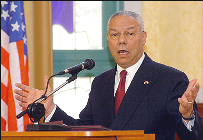UN council mulls Sudan resolution, US to speak on genocide
UNITED NATIONS, Sept 9 (AFP) — The UN Security Council was to discuss a new US draft resolution on Thursday aimed at tightening the pressure on Sudan over the crisis in Darfur, including possible sanctions on its oil sector.
 The meeting will come as US Secretary of State Colin Powell testifies to the US Senate on whether the Darfur bloodshed, what the UN calls the worst humanitarian crisis in the world today, constitutes genocide.
The meeting will come as US Secretary of State Colin Powell testifies to the US Senate on whether the Darfur bloodshed, what the UN calls the worst humanitarian crisis in the world today, constitutes genocide.
Washington has been piling pressure on the government in Khartoum, which is accused of arming and backing the Arab militias, known as Janjaweed, that have rampaged through Sudan’s western Darfur region.
An estimated 50,000 people have been killed and 1.4 million more uprooted in a campaign against black Africans that started out as an attempt to put down a rebel uprising launched in February 2003.
Reports of widespread rape, villages burnt to the ground and other atrocities by the Arab militias have drawn international concern but also disagreement over how to get Sudan to stop the violence.
The Security Council passed a first resolution on July 30 that gave Khartoum 30 days to disarm and rein in the Janjaweed, end restrictions on aid workers in Darfur and take other steps to end the chaos — or face unspecified sanctions.
After that deadline passed, UN Sudan envoy Jan Pronk reported to the council that the government had not resolved the crisis or met all of the commitments that it had made to try to do so.
The new US draft raises the threat of sanctions on Sudan’s oil industry if Sudan does not comply with the previous resolution.
It also calls on Sudan to accept an expanded African Union mission already monitoring an April ceasefire between the government and rebels, and asks the United Nations for an enquiry to determine if genocide has occurred.
In addition, the draft says Sudan must stop military flights over the region — the Sudanese military has reportedly carried out air attacks on villages — and bring to justice militiamen who have committed abuses.
But diplomats said the strengthened measures would come under serious scrutiny on the 15-nation Security Council.
The last resolution in July passed 13-0, with China and Pakistan abstaining, only after the word “sanctions” was dropped. Like that measure, the new resolution also avoids direct use of the word.
Abdallah Baali, UN ambassador from Algeria, the council’s lone Arab member, said any success in ending the bloodshed depended on the cooperation of the Arab-led government in Khartoum.
“Nobody else is going (to be able) to do it,” Baali told AFP. “We have seen some important progress made, and so our view is to work closely with the government.”
Sudan has rejected any expansion of the mandate of the African Union’s observers beyond monitoring the ceasefire, claimed that only around 5,000 people have been killed — and allegedly kept up the killing.
The resolution refers to reported helicopter assaults and Janjaweed attacks on August 26 on three villages in Darfur, a vast desert area the size of France.
The Washington Post on Thursday called the draft a “milquetoast resolution that … creates the appearance of action without the substance,” and urged Powell to broker a “tougher resolution that delivers on July’s threat of sanctions and then threatens more if Sudan’s government fails to accept the African Union force.”
In Nigeria, African Union-sponsored talks with the government and rebels have made little progress in three weeks and hit another snag on Wednesday when Sudan rejected a draft protocol on security and disarmament questions.
Meanwhile in Washington, Colin Powell was to give a Senate committee the results from interviews with more than 1,000 of the estimated 200,000 Darfur residents who have sought refuge in neighbouring Chad.
“What these interviews have revealed is that there is a consistent pattern to the attacks,” State Department spokesman Richard Boucher said.
“The villages are surrounded. People who flee are attacked and chased down, and the villages are looted and burned. That unfortunately has been a pattern that we’ve seen again and again,” he said.
